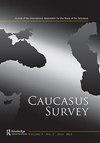Russia’s policy in the “frozen conflicts” of the post-Soviet space: from ethno-politics to geopolitics
IF 0.5
Q3 AREA STUDIES
引用次数: 9
Abstract
ABSTRACT The article analyzes the evolution of Russia’s policy in secessionist conflicts in the post-Soviet space in 1991–2018. The authors differentiate the patterns of Russian policy between the “first” and “second” generation of frozen conflicts. The “first generation” includes four conflicts of an ethno-linguistic nature that arose out of the collapse of the USSR in the early 1990s (Abkhazia, South Ossetia, Pridnestrov’e and Karabakh). Most commentators interpret Russia’s actions in the “second generation” conflicts as centralized, directly controlled by the president of Russia, and driven by Russia’s opposition to NATO expansion, and some extend this logic back to the conflicts of the 1990s. However, this article argues that this was not true of Russian policy for the “first generation” conflicts in the early 1990s. In that period the policies of the Yeltsin administration were a product of struggle of different forces both in Moscow and outside of it. The “first generation” conflicts all primarily originated as a result of local grievances. Gradually, shifts in the broader geopolitical landscape in Eurasia, especially the growing confrontation between Russia and the West, led to a reconfiguration of the logic of these conflicts, turning them into the elements of Russian-Western geopolitical opposition.俄罗斯在后苏联空间“冰冻冲突”中的政策:从民族政治到地缘政治
摘要本文分析了1991-2018年俄罗斯在后苏联空间分离主义冲突中的政策演变。作者将俄罗斯的政策模式区分为“第一代”和“第二代”冻结冲突。“第一代”包括20世纪90年代初苏联解体后产生的四场民族语言性质的冲突(阿布哈兹、南奥塞梯、普里德尼斯特罗夫和卡拉巴赫)。大多数评论家将俄罗斯在“第二代”冲突中的行动解释为中央集权,由俄罗斯总统直接控制,并由俄罗斯反对北约扩张所驱动,一些人将这种逻辑追溯到20世纪90年代的冲突。然而,这篇文章认为,俄罗斯在20世纪90年代初针对“第一代”冲突的政策并非如此。在那个时期,叶利钦政府的政策是莫斯科内外不同势力斗争的产物。“第一代”冲突都主要源于当地的不满。渐渐地,欧亚大陆更广泛的地缘政治格局发生了变化,特别是俄罗斯与西方之间日益加剧的对抗,导致了这些冲突的逻辑重组,使其成为俄罗斯与西方地缘政治对立的要素。
本文章由计算机程序翻译,如有差异,请以英文原文为准。
求助全文
约1分钟内获得全文
求助全文
来源期刊

Caucasus Survey
Arts and Humanities-History
CiteScore
1.30
自引率
9.10%
发文量
4
期刊介绍:
Caucasus Survey is a new peer-reviewed, multidisciplinary and independent journal, concerned with the study of the Caucasus – the independent republics of Armenia, Azerbaijan and Georgia, de facto entities in the area and the North Caucasian republics and regions of the Russian Federation. Also covered are issues relating to the Republic of Kalmykia, Crimea, the Cossacks, Nogays, and Caucasian diasporas. Caucasus Survey aims to advance an area studies tradition in the humanities and social sciences about and from the Caucasus, connecting this tradition with core disciplinary concerns in the fields of history, political science, sociology, anthropology, cultural and religious studies, economics, political geography and demography, security, war and peace studies, and social psychology. Research enhancing understanding of the region’s conflicts and relations between the Russian Federation and the Caucasus, internationally and domestically with regard to the North Caucasus, features high in our concerns.
 求助内容:
求助内容: 应助结果提醒方式:
应助结果提醒方式:


